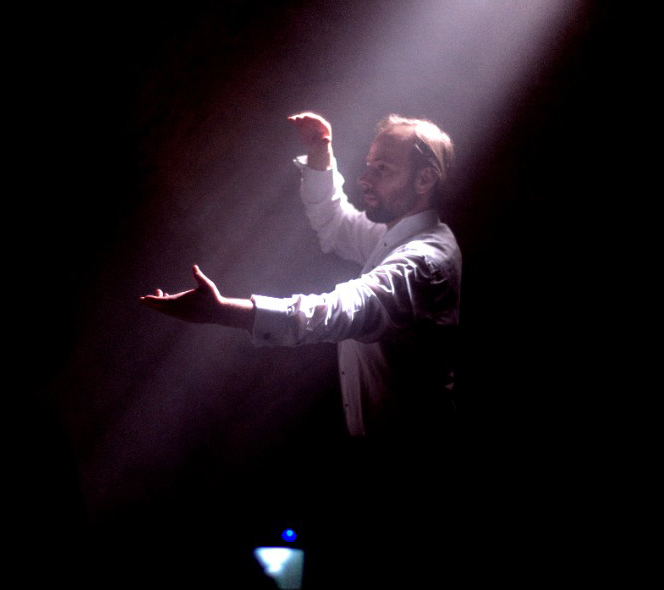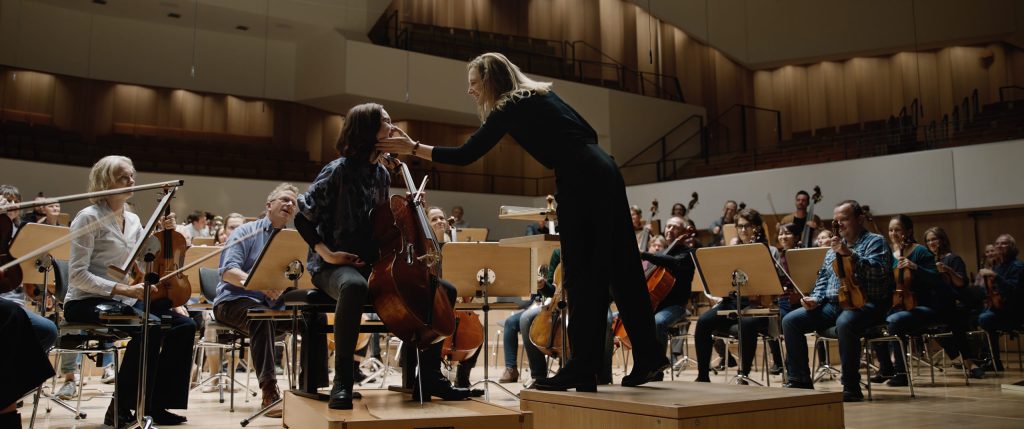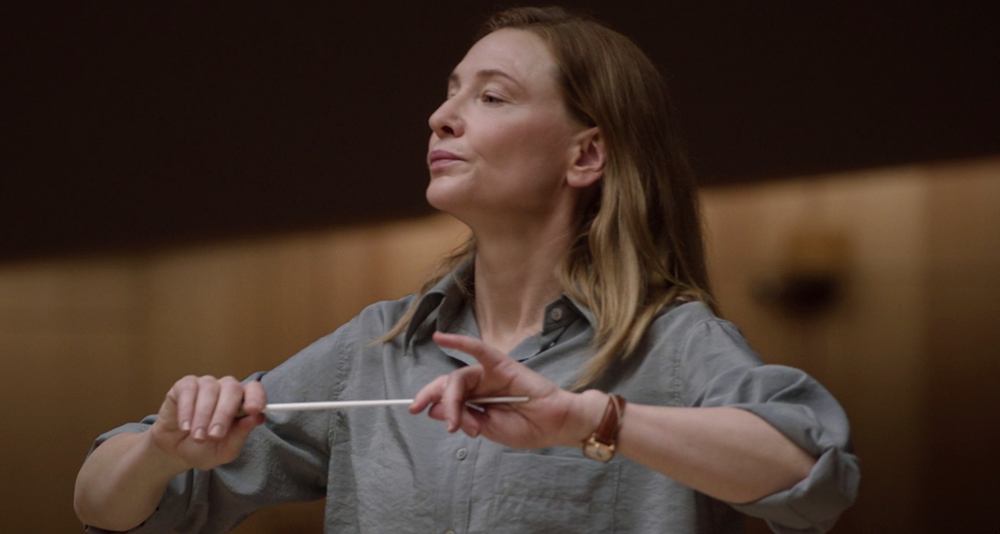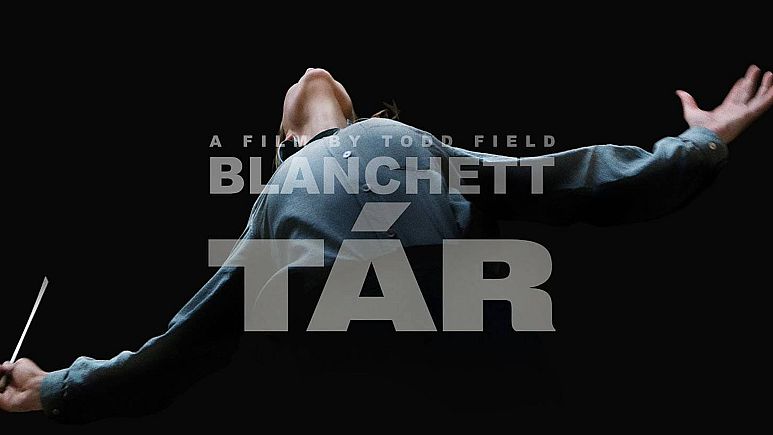by Jan Bubák
Down with conductors
It’s always a big deal when an otherwise unfamiliar area of pop culture opens up to a wider audience. It won’t be every day that we get another opportunity like this, letting audiences peek behind the scenes of the slowly shrinking world of classical music. The story can be succinctly described as a chronicle of a global career – Lydia Tár, the first woman to lead the Berlin Philharmonic, is destroyed by her own power drunkenness.
Director and screenwriter Todd Field calls the musical environment a pyramid of power ruled by conductors. The others are just pariahs. But he’s a little behind the times. Hasn’t he noticed today’s intricate relationships of grey eminences, agencies, lobbyists, CEOs and artistic boards? Valery Gergiev or Daniel Barenboim being the only notable exceptions. Field sees the world of classical music as a class domain that is “intimidating by design” and portrays this milieu with the utmost gusto for rottenness and decadence.
In doing so, however, he does a disservice to women conductors in the eyes of the audience. The story presents Lydia Tár as a nightmare for musicians, abusing the orchestra like Toscanini in his prime, perhaps deliberately trying to be rude and unempathic. That’s her way to the top. But today there is no reason why female conductors in particular should create mimicry out of stereotypical male traits. I am a strong supporter of women conductors, once I almost married one of them. I don’t remember her ever having to assert her dominance violently. Even more so we don’t live in American society.

The film has aroused a desire in the English speaking media to finally organise the last hunt for those conductor despots and narcissists and to put a proper stop to them. In the film, the character of retired conductor Davis actually warns against this: “Nowadays, to be accused is the same as being guilty. ” The British Spectator, for example, chose to hound John Eliot Gardiner for his unforgiving attitude to musicians and promoters, making him a model bully. And other media – including the European ones – readily parrot this claim.
Resemblance purely coincidental?
The production put a huge amount of energy into the film – Cate Blanchett learned to conduct, play the piano, many small details are meticulously worked out. The screenwriters have portrayed Lydia as an internally unbalanced individual: on the one hand a maximally sensitive artist, but in real life an insensitive and mob personality. How true is the depiction of the career destruction of the student Krista Taylor, who first was convenient Lydia, only to destroy her without blinking an eye. The behind-the-scenes moments are also very subtly shown – the cynical reactions of some of the musicians toward their failing artistic director are perhaps even closer to reality than is comfortable.
In an effort to be as realistic as possible, the filmmakers borrowed elements and events from the lives of real-life conducting stars, even depicting some of them in their own future. They used many motifs from the life of American conductor Marin Alsop (*1956) as a foreshadowing of Lydia Tarr – studying with Leonard Bernstein, professorship at a respected American music college, a foundation to support young female conductors, a lesbian family raising a daughter. Alsop didn’t find out about the film until it was finished and her fears turned to anger after the premiere. The creators deeply offended her by the character’s despicable tone.
In Lydia’s email correspondence we see that she corresponds with the current chief conductors of the world’s greatest orchestras (Jaap van Zweden, Gustavo Dudamel, Ricardo Chailly and others). The new assistant conductor she refers to is the real conductor Andrew Crust. Next on screen is the “aged” Andris Nelsons (*1978) under the name Andris Davis. But the bizarre personality of Gilbert Kaplan (1941-2016), renamed Eliot Kaplan, gets it the most. Kaplan was a real-life wealthy businessman, an amateur conductor who traveled the world and paid the best orchestras to play a single piece under him – the 2nd. Mahler’s symphony. In the movie, it is Kaplan who is invited by the Berlin Philharmonic to take over Lydia’s already rehearsed concert of Mahler’s 5th Symphony at a moment when she is experiencing a cancel campaign. For any conductor, it’s really sensitive to have their programme taken away, so Lydia interrupts the concert in a temper tantrum and uncompromisingly beats Kaplan – the king of posers- up on the podium. This excess results in her steep fall – she loses her family, the Berlin Philharmonic and is eventually glad for a job as conductor of an amateur university orchestra somewhere in the Philippines. The hell doesn’t have to pick and choose its prey.

Conducting lesson
The most interesting scene of the whole film is the conducting lesson at the Juilliard School. I was surprised to see such a stinging critique of current trends in an American film. A young adept conductor tries to justify why he does not know the music of Johann Sebastian Bach. He voices the argument that he, as a pangender BIPOC person, cannot respect the music of a heterosexual white man. The story illustrates the almost everyday situation in which someone, under the influence of ideology, assigns categories to the transcendental music message that music does not carry in itself. Lydia responds to today’s trends with a tough stance: she says it is an injustice to divide composers into white, black, Catholic, Muslim, male or female. Music is so precious that it does not belong in the hands of ideologues. But a recording of her lecture appears in a doctored edit on Twitter and is the first stumbling block that will start her free fall.
If you really focus on the story, you will find this film far more rewarding than the standard commercial production that dominates our theatres. Within a two and a half hour running time, Todd Field addresses not only the pains of the classical music world, but also the pressing issues of us all. BAFTA, AACTA and Golden Globe Awards for Cate Blanchett are certainly well-deserved, and rightfully this film is also expecting the Oscars.

Tár
Film – Drama / Music
USA, 2022, 158 min
Universal Pictures




